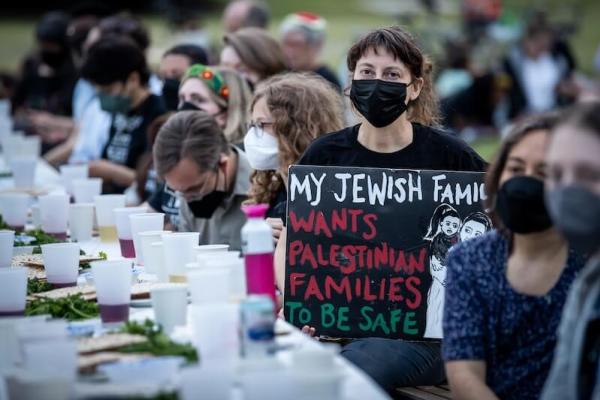Today we observe Veteran’s Day, a day in which many people thank servicemen and women and veterans for their service to the country. Justin Roberts served as chaplain to the 2nd 327th Infantry Battalion, part of the 101st Airborne Division. In his new documentary No Greater Love, the retired U.S. Army chaplain interviews many of the soldiers from the unit, documenting the service, sacrifice, and suffering of these men.
I had the opportunity to speak with Chaplain Roberts about the film. The interview has been edited for clarity and for length.
Juliet Vedral, for Sojourners: What made you choose to become an army chaplain?
Chaplain Justin Roberts, director, No Greater Love: When I was 13 … I struggled with suicide. When I was trying to figure out how to do it, I looked over on my nightstand [and] here was a Bible that a lady from a church had actually given me. I figured I would check it out and see what this God-thing had and if there were any answers to it, before I tried to take my own life. I started thumbing through it and at the very beginning, she wrote, “Please don’t try to go through all of this, just start with these Scriptures and then turn to the back of the book.” aWhat the lady had done was walk me through the “Roman road,” where I found out that God loves me and his son died for me so that way I could be free from my sins.
...Every generation we had someone in our family who had served in the military, so I knew I wanted to go into the army, and I wanted to go into the ministry. And I didn’t realize how I could combine the two until I learned about the Chaplain Corps.
Vedral: Has your experience in Afghanistan and serving as a chaplain changed or reshaped your faith?
Roberts: My second day on the job, we had a suicide in our unit and then we had another one a week later. And then we had another one a couple of months later after that. And then another one. We had weekly suicide attempts or gestures every week for the first six months.
[In] 2009, the unit that I came to — that’s featured in No Greater Love — was one of the most suicidal battalions in the military.
That was a dark place. ...It kind of felt like that evil, depressing thing of suicide had come back around, something that had haunted me when I was 13, and my own father’s struggle with it. ...But it also kind of felt like, this is where God has me.
We focused on a relational way to try and tackle this issue, which was relationships — we just sat down together as groups and we talked about the issues that were going on in the unit. And we also began to do several activities together — rock climbing, hunting, fishing, barbecues — the way that people actually build relationships. That program is called Warrior’s Keeper.
We did that before we deployed, and leading up all the way to deployment. And then we suffered a pretty traumatic deployment. When we were coming back, at first the expectation was that since we were suicidal on the front-end and we had a traumatic deployment, we would be suicidal when we got home. Instead we had fewer suicides and a 70 percent reduction in suicidal ideation. It wasn’t because my sermons were getting better — my sermons weren’t getting better! It was just because people were connecting and talking.
I say all that to say that this issue is not unsolvable. This mysterious issue of suicide is not just a creeping thing that we can’t fix. We can fix it. But we have to rally up as communities.
And that includes the church. There’s 20-plus suicide per day in the military but only 27 percent of churches (are reported to) hav any kind of veteran’s initiative. So when we say “Thank you for your service,” when we say “God bless the troops,” when we say these platitudes or gratitudes — they might be heartfelt, but they’re not going to lower the suicide rate. What we need is action. What we need is the church stepping up.
Vedral: What changes do you think could be made, systematically, to help different branches of the military improve the way they work with veterans and active duty soldiers to address those mental health issues? You mentioned talking it out and relationship — are there other ways?
Roberts: We have to give space and time for veterans to be a part of their own community, and for active duty military to have community time to connect relationally.
The problem that exists in the military is, it’s not 9-5 — they own you 24/7. And they can call you up any time. You’ll be gone for a year. And when you come home, you’re not going to get a whole lot of family time either. ...For you to process trauma it takes people. And if we don’t process trauma, it’s going to become deadly. We need these networks of relationships.
...The problem really isn’t the government (or) the (U.S. Department of) Veteran Affairs. The VA was never built to be our friend and a part of our community. The problem isn’t even necessarily even just the military. Right now the problem, and the number one thing we need to fix, is communities — actually getting them mobilized, instead of having them say, “This is what other people need to do.” We need to have them start asking, “What can I do to help our veterans?”
This Veteran’s Day weekend, across America, pastors are going to have veterans in churches stand up, and we’re all going to applaud them. We’re all going to say “Thank you for your service.” And for the most part, the majority of churches are going to do nothing to help them.
One-(tenth) of our homeless population are veterans but only one percent of our country is serving in the military. The great irony is that these people who raised their right hand to defend our homes, fight for our liberties, and fight for our families and our lives are losing theirs in the process of that service.
Vedral: In the film, you and others mention some of the challenges for veterans in “coming home” — like the addictive rush of combat, and the loss of brotherhood and community that they had when they were serving together. How can people who have never been in that situation understand and have empathy for something we won’t always understand?
Roberts: What we’re talking about is not just a military thing, it’s a human thing. How do we connect with people who have gone through trauma? ...I think it just has to be approached with that kind of heart. These are people who have served us, and even though we’re not all called to serve overseas, we are called to serve each other.
So this is that time, at the end of America’s longest war — it is now time for the church to determine how it wants to respond. Is it going to respond with apathy and ignorance, or is it going to respond with love and connection? Is it going to stand for those who have stood for us? It can’t wait. If we wait another year, that’s gonna be thousands (more) lives lost to suicides.
...But, you know, the film itself is not about suicide. It’s about the love that these people fight for. What I saw over there was that behind every act of valor and sacrifice was a selfless love. That was the common denominator in all of these courageous actions. And that’s who these guys are.
So … my hope is that people can see the film and learn the same lessons I that learned from these guys.
No Greater Love is now playing in select theaters.
Got something to say about what you're reading? We value your feedback!







